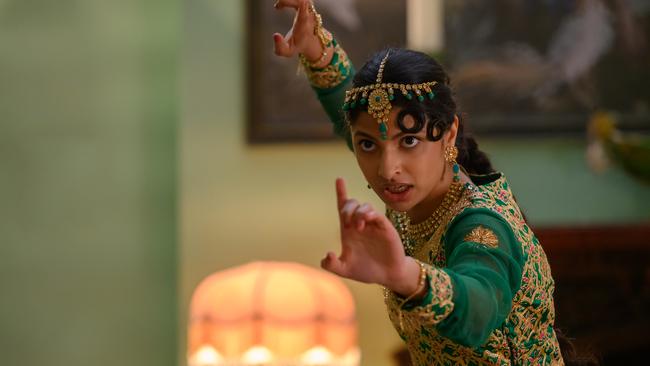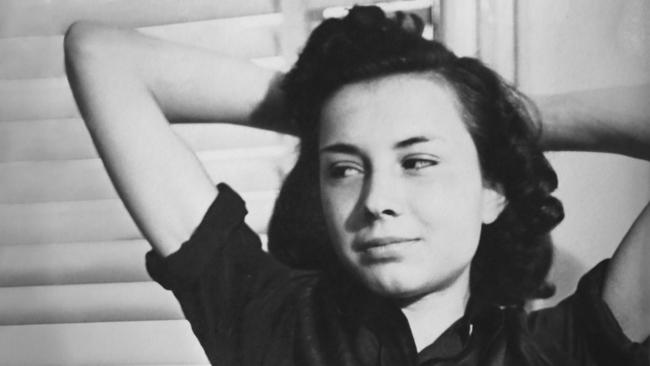Polite Society film review: Mr Darcy meets Basil Fawlty in promising debut for Nida Manzoor
Nida Manzoor’s Polite Society starts out as a Pakistani Pride and Prejudice in today’s London and leaps an impressive distance from there.

Polite Society (M)
In cinemas
★★★½
British-Pakistani filmmaker Nida Manzoor created, wrote and directed the 2021 sitcom We Are Lady Parts, centred on a punk band comprised of Muslim women. She has directed two episodes of Dr Who. Her cited inspirations range from Jackie Chan to Basil Fawlty.
All these artistic influences – and a lot more – pop up in her debut feature Polite Society. This comedy-drama starts out as a Pakistani Pride and Prejudice in today’s London and leaps an impressive distance from there.
Films that come to mind as the plot develops include Ang Lee’s Crouching Tiger, Hidden Dragon (2000), Steven Soderbergh’s Oceans Eleven (2001), David Cronenberg’s Dead Ringers (1988) Jordan Peele’s Get Out (2017) and Us (2019) and even Carl Reiner’s The Man With Two Brains (1983). I’m sure viewers will think of others.
Ria Khan (Priya Kansara) is a London high schooler who does martial arts and plans to become a movie stuntwoman like her idol Eunice Huthart (the real Huthart, a regular stunt double for Angelina Jolie, has a voice cameo).
Her older sister Lena (Rita Arya) has dropped out of art school and is a bit lost. This changes when she meets Salim (Aksha Khanna), a handsome doctor who specialises in women’s health. In short time they are engaged.
This is the trigger for the mayhem that follows. Ria, close to her sister, wants to stop the marriage, for reasons that start out simple and then become complex.
Initially, Ria accuses Lena of going “1800s retro … throwing your life away to marry some rich Mr Darcy wanker”. As it turns out, embracing Pride and Prejudice might have been a good option.
The director sets up adolescent Ria as the catastrophiser, the Cassandra of Greek myth if you like, and then moves around the Trojan horse.
Ria admits she has an “overactive imagination” and for a while that seems to be true. Until, to take one example, the torture scene involving hair-waxing beauticians. Almost all the martial arts fight scenes – and they are dramatic – are between women.
The cast is great, in a deliberately melodramatic way. The standouts are Nimra Bucha as Raheela, mother of the groom-to-be, and Seraphina Beh and Ella Bruccoleri as Clara and Alba, the best friends Ria recruits to help stop the wedding.
“Behind every great man is a tired mother,’’ Raheela says. We sympathise, until she explains further. Clara and Alba add the Ocean’s Eleven touch, including the snappy dialogue. The scene where they, in moustachioed disguise, infiltrate a gym locker room full of naked men is a highlight.
This 104-minute movie is a promising big screen debut from Manzoor, who is 33. It will be interesting to see what she does next.
Loving Highsmith (M)
Available on Amazon Prime, Apple TV, Fetch, DocPlay
★★★½
Wow, I am glad I never tried to date the American writer Patricia Highsmith. Not because I know she was way out of my league or because I ponder her creation of guilt-free killers such as Tom Ripley.
But because, for her, kissing a man is “like falling into a bucket of oysters” and going further, all the way to home base, is “like steel wool in the face”.
These observations about heterosexual romance and sex, read from Highsmith’s diaries and notebooks, are part of the fascinating documentary Loving Highsmith, written and directed by Swiss filmmaker Eva Vitija.
Vitija says she loves Highsmith’s novels, as have directors from Alfred Hitchcock onwards, but when she started reading the author’s then-unpublished diaries, “I fell in love with Patricia Highsmith herself”.
So did a lot of other women, and the director interviews several of Highsmith’s lovers, including the American writer Marijane Meaker, who lived with Highsmith in Pennsylvania.
“She had a strangeness,” says Meaker, who died in 2022. “She picked strange ideas that I would never be able to think of.”
Highsmith, who died in 1995, aged 74, would not disagree. “Ever since I was 16 or 17,’’ she says in one of the television interviews used in the film, “I’d get what is sometimes called creepy ideas.”
We then cut to the knockout opening scene in Hitchcock’s Strangers on a Train (1951), based on Highsmith’s 1950 debut novel, where one man says to another, “Wanna hear one of my ideas for a perfect murder?”

It’s a good example of how the director blends Highsmith’s private thoughts with her psychological thrillers and the film adaptations that followed.
A defining one is Todd Haynes’s 2015 drama Carol, starring Cate Blanchett, which is based on Highsmith’s second novel, The Price of Salt (1952). Highsmith, then 31, wrote the novel under a pseudonym, Claire Morgan, partly because she did not want her mother to know she was the author.
The novel was shocking for two reasons: first it centred on a lesbian relationship featuring a married woman; second it didn’t end unhappily.
“Slashing their wrists was the way,’’ Highsmith says of the general approach to lesbian literature in 1950s America.
The novel was republished in 1990 under Highsmith’s name and titled Carol. The titular Carol is based on more than one woman in Highsmith’s life. The main one, though, is a former lover the director does not speak to as she died well before the film was made.
“I am divinely happy with her,’’ Highsmith writes in her diary. “As though I lived in a dream world and yet it is real.”
The title of this 84-minute documentary states its intent. This is not a cradle-to-grave biography. We learn little of Highsmith’s Texas childhood beyond the fact she was abandoned by her mother. Her Texas relatives are interviewed. They say young Pat left the “ranching and rodeo” state as soon as she could.
We learn nothing about Highsmith’s education. Her notebooks were written in English, French, German and Spanish. She lived much of her adult life in Europe and in the TV interviews speaks whichever native tongue is required.
This movie is about some of the women — in Paris, Berlin, England and the US — who loved Highsmith and who she loved in return. They tell their stories and so does Highsmith, via her diaries.
The younger Highsmith did have sex with men, as the earlier quotes indicate, because she felt obliged to. “I attempted this sexual intercourse several times,’’ she writes in her diary.
The diary entries, read by English actor Gwendoline Christie (aka Brienne of Tarth in Game of Thrones) are revealing, as are the media interviews, which Highsmith found a “profound indignity”.
In her diaries, Highsmith describes the regular entries on her homosexuality as “notes on an ever present subject”. On TV, she talks about the man, who she saw but never met, who inspired Ripley. One of her ex-lovers says Ripley is Highsmith’s alter ego.
The director has described this documentary as a “love biography”. Perhaps no surprise then that some of the unpleasant aspects of Highsmith’s life, such as her anti-Semitism, racism, alcoholism and, barring Carol, the lack of female protagonists in her work, are skated over.
That’s the director’s choice. Anyone who wants to catch up on these parts of Highsmith’s life can find them elsewhere. Her views on Jews are included in a 2021 book that extracts her diaries and notebooks, which totalled 8000 pages.
What this documentary does is take us into the idiosyncratic mind of the writer who started her career with an idea about two men who strike a deal: I’ll kill your wife if you kill my father.
More than one of Highsmith’s ex-lovers suggest she was a remote person. With that in mind, this quote, from an interview on French TV, is a good one to end with.
The interviewer notes that Highsmith lives alone in a small French village. When she says she likes the peace and quiet, he asks, “A room full of people you like can be good, too?”
“Oui,’’ she says with a nod. Then she smiles. “If you can find them; find people you like.”




To join the conversation, please log in. Don't have an account? Register
Join the conversation, you are commenting as Logout